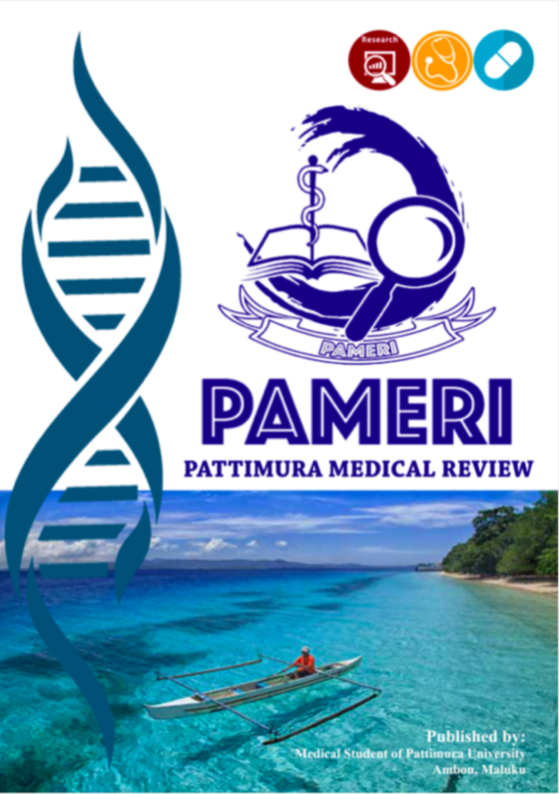ABLASI RADIOFREKUENSI PADA SEORANG WANITA MUDA DENGAN JALUR ASESORIS MULTIPEL KOEKSISTENSI DENGAN SINDROM WOLFF-PARKINSON-WHITE, ATRIOVENTRICULAR NODAL REETRANT TACHICARDYA DAN TAKIKARDI VENTRIKEL
Abstract
Introduction. Wolff-Parkinson-White (WPW) syndrome is a common form of preexitation syndrome and usually present with supraventricular tachycardia (SVT). It is characterized by presence of an accessory pathway which lead to tachyarrhythmia and sudden cardiac death. Among patients with WPW syndrome, multiple reentry circuits are relatively common. Coexistence of more than one type tachycardia in an individual patientis a well-known but infrequent phenomenon. Report. We present a-20 years old woman who had frequent episodes of palpitation and dizziness since 3 years ago. Frequently hospitalized in rural hospital then referred to us. During electrophysiology study, retrograde atrial activation showed two types of tachycardia, orthodromic tachycardia incorporating left lateral accessory pathway and wide complex tachycardia. After successful multiple ablation was performed in left lateral location, we conducted another pacing and induced another tachycardia with earliest activation shown as orthodromic tachycardia in CS 9-10, another ablation was performed in anteroseptal location. Following the successful ablation of accessory pathway, ventricular tachycardia inducibility was tested. Either SVT or VT was not induced by anyprogrammed ventricular stimulation. We stop. Conclussion. Multiple accessory pathway are relatively common in WPW syndome patient during electrophysiology study. In our case, multiple accessory with different electrophysiology properties manifest in left lateral and anteroseptal accessory pathway causing AVRT with 2 different morphologies which were induced after initial ablation. All effort should be made to induce another possible tachycardia after initial successful ablation.
Downloads
References
Sethi KK, Dhall A, Chadha DS. WPW and pre-exitation syndrome. JAPI. 2007;55:10-15.
Schernthaner C, Danmayr F, Strohmer B. Coexistence of atrioventricular nodal reentrant tachycardia with other forms of arrhythmias. Med Princ Pract. 2014; 23:543-550.
Zardini M, Leitch JW, Guiraudon GM, et al. Atrioventricular nodal reentry and dual atrioventricular node physiology in patients undergoing accessory pathway ablation. American Journal of Cardiology. 1990; 66:1388-1389.
Sarsam S, Sidiqi I, Shah D, et al. Concomitant wolff-parkinson-white and atrioventricular nodal reentrant tachycardia: which pathway to ablate?. Am J Case Rep. 2015; 16:872-875.
Elitok A, Aksan G, Sonsoz MR, et al. The coexistence of wolff-parkinson-white syndrome (WPW) and atrioventricular nodal reentrant tachycardia (AVNRT). Turkish Journal of Emergency Medicine. 2018;30:1-3.
Kuo JY, Tai CT, Chiang CE, et al. Mechanisms of transition between double paroxysmal supraventricular tachycardias. J Cardiovasc Electrophysiol. 2001;12:1339-1345.
Perrot BB, Chaise AT, Izaaz K, et al. Inducible multiform ventricular tachycardia in Wolff-Parkinson-White syndrome. Br Heart J. 1987;58:89-95.
Benditt DG, Pritchett ELC, Gallagher JJ. Spectrum of regular tachycardias with wide QRS complexes in patients with accessory pathways. Am J Cardiol. 1978;42:828-38.
Milstein S, Sharma AD, Klein GJ. Non clinical ventricular tachycardia in the Wolff Parkinson White syndrome. PACE. 1985;8:678-83.
Copyright (c) 2021 PAMERI: Pattimura Medical Review

This work is licensed under a Creative Commons Attribution-NonCommercial-ShareAlike 4.0 International License.











